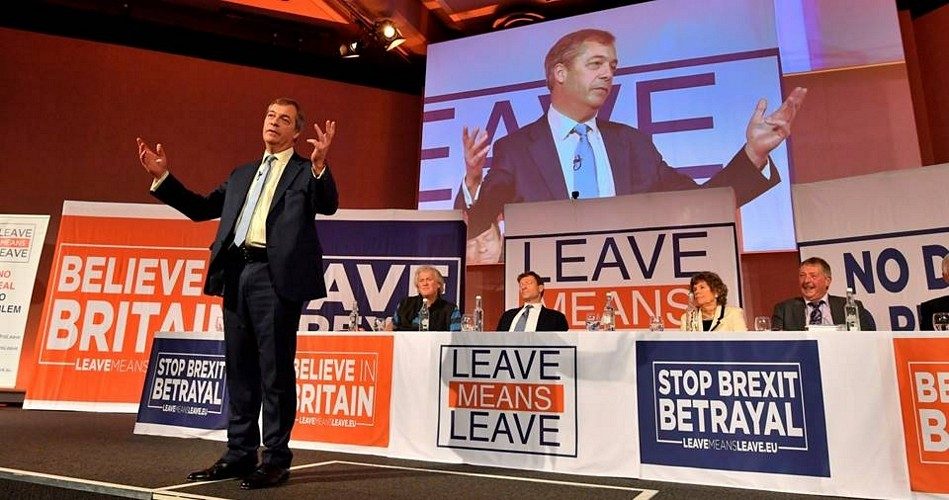
As children, we called it a “do-over.” If something unexpected intruded upon a game we were playing and caused a muddled result, we could simply agree to a “do-over,” to ensure a fair result. Some in Great Britain now believe such a “do-over” is called for, in what might be the most significant national referendum in the history of the world, namely Brexit.
With Prime Minister Theresa May having just survived a vote of no-confidence in the House of Commons and her Chequers deal on life support, some believe that the PM may be desperate enough to appeal once more to the people of Great Britain and ask, “Do we really really wish to leave the European Union?
Only a few months ago, the very idea of a second referendum seemed ridiculous. But now, some serious players in the U.K. government are considering a new referendum as a way out of the chaotic mess that Brexit has become.
Many in the U.K., including former globalist PM Tony Blair, believe that many members of Parliament (MPs) might back another referendum if the plug is ultimately pulled on May’s deal. Referencing the idea of a new referendum, Blair told the BBC, “Far from being anti-democratic, it would be the opposite, as indeed many senior figures in her (May’s) party from past and present have been saying.”
For now, the prime minister remains resolved to push through on her current deal. May responded to Blair’s advice rather angrily. “For Tony Blair to go to Brussels and seek to undermine our negotiations by advocating for a second referendum is an insult to the office he once held and the people he once served,” May said.
“We cannot, as he Blair would, abdicate responsibility for this decision,” May concluded.
Although publicly May is strongly against a new referendum, privately she has mentioned it as a possibility, according to some government ministers. That shows that she is at least thinking about it.
{modulepos inner_text_ad
Some of Brexit’s strongest supporters are now publicly admitting that the possibility of a new referendum exists. Even Nigel Farage (shown), one of the preeminent figures in the original push for Brexit, recently conceded the possibility. At a rally in London, Farage said, “My message folks tonight is: As much as I don’t want a second referendum, it would be wrong of us on a ‘leave means leave’ platform not to get ready, not to be prepared for a worst-case scenario.”
The best argument for a new referendum seems to be this: If no deal that British and EU negotiators can come up with will make it through Parliament, then the issue must go back to the people.
But the original referendum question seemed clear enough. “Should the United Kingdom remain a member of the European Union or leave the European Union?” Two choices were then given, “Remain a member of the European Union” or “Leave the European Union.”
“Leave the European Union won.” Case closed, right?
But certain MPs and the EU itself have made May’s task nearly impossible. Hard-line Brexiteers such as Jacob Rees-Mogg and Boris Johnson have complained that her Chequer’s plan for leaving the EU amounted to a “soft Brexit” in which Great Britain remained closely tied to the EU without any voting powers. Meanwhile, many “remainers” in the Labour Party have pressed for closer relations with the EU.
For the EU, losing Great Britain represents a loss of the power and prestige that the EU now has. When Great Britain leaves, the EU loses 13.4 percent of its budget, along with the international influence historically wielded by Great Britain.
The Times is reporting that a potential new referendum may offer U.K. voters three choices. 1) Use May’s deal as a means to leave the EU. 2) A “no deal” or hard Brexit, in which the U.K. simply leaves the EU without a deal. Or, 3) Remain in the EU.
Another option that seems likely at this point is that Great Britain can ask for an extension of the March 29, 2019 leave date and attempt to negotiate a new deal. This could potentially tie the U.K. to the EU for years to come.
But voters in the U.K. have already decided on this issue. Any new referendum or “do-over” would be antithetical to democracy where the result of a vote actually means something. Why should voters in the U.K. be forced to vote again on something they’ve already decided upon? Why shouldn’t Parliament and the Prime Minister be expected to simply do their job and respect the will of the people, which was made known in 2016?
At this point, a “no deal” Brexit would be preferable to any of the other options. Then, at least, Great Britain would be negotiating with the EU as a sovereign country and not as a member of a globalist entity.
Photo: AP Images



